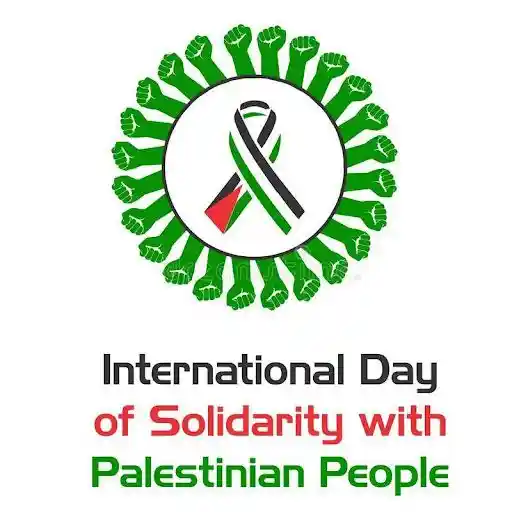International Day of Solidarity with the Palestinian People
Acclaimed Palestinian poet Mahmoud Darwish once wrote about his beloved: "Out of my ignorance, I called you a homeland, and I forgot that homelands are taken away." This association of love with one's native land and the irrevocable loss of both in his poetry is a microcosm of the lives of Palestinians. As one of the most enduring transnational conflicts that have adversely influenced global politics since its inception, the tussle over Palestine between Arabs and Israelis has left behind a blazing trail of intolerance, poverty, devastation, and rootlessness.

(The closed fist denoting solidarity, the world stands with and for the Palestinian cause; image source: Google)
The International Day of Solidarity with the Palestinian People is an annual observance organized by the United Nations. Brought into effect in 1978 after a Resolution adopted by the General Assembly, the date of commemoration has a special significance attached to it. Thirty years ago, on November 29, 1947, the infamous Palestine Partition Plan was passed, seeking to divide the disputed land. The plan for an Arab city and a Jewish city was formulated, with Jerusalem - a holy city for Christians, Muslims, and Jews alike, to be placed under an International Trusteeship System. This was partly accepted by the Zionists, or Jewish nationalists, creating the State of Israel for Jews in 1948. Due to the non-cooperation of Arab Nationalists, a separate province for the Arabs could not be formed.
The root of the Arab-Israel conflict has mythical origins and can be traced back to Biblical times. Judaism, Islam, and Christianity - three monotheistic religions emerge from Abraham, the Hebrew patriarch, and his progeny. The Palestinian city of Hebron is where Abraham lay buried and in popular belief, is considered the road to the Garden of Eden. Naturally, Palestine possesses great religious significance for the three faiths.
The symbolic idea of a Jewish homeland was first expressed in Theodor Herzl's 1896 book Der Judenstaat, or The State of The Jews. It propagated the idea that Jews, so long persecuted ruthlessly all over Europe, would never be unconditionally integrated as citizens anywhere except their historic homeland of Palestine. It provoked an immediate reaction upon publication, having a soothing effect on the embittered Jews who had endured centuries of oppression. Herzl was later hailed as the Father of modern political Zionism.
Cut to the post-World War I period, Hitler's anti-Semitic policies forced millions of Jews to flee from Germany to various parts of Europe. It was at this time that Palestine saw a massive influx of Jews, angering the Arab population already residing in and around the region. The Arabs, having embraced Islam, had emerged as a fearsome community conquering several territories in the past, of which Palestine was also a part. The growing Jewish population acted as a threat to the ethnic homogeneity of the region. However, it was the United Kingdom's conflicting diplomacy that saturated the already worsening situation. They promised Palestine to the Jews in return for their financial support for Britain's war efforts, completely disregarding the previous pledge made by General McMahon to the Arabs of granting all the Arab states self-rule post-first world war. The penalty for such duplicity is being paid till today as riots, bombings, and communal troubles continue flaring between Arabs and Jews. Peaceful settlements have been proven ineffective because of continuing non-cooperation and ensuing wars between Israel and the Arab nations of Egypt, Jordan, and Syria. Peace efforts have been made, like the Camp David Accord between Israel and Egypt and Oslo Peace Accord between Israel and the PLO (Palestine Liberation Organisation), but no permanent and irreversible settlement has been reached. The people of Palestine are still haunted by the sounds of war and live with the constant threat of eviction from their native soil.
The purpose of commemorating the day is to refocus global attention on the unsolved problem of Palestine and that "the Palestinian people have yet to attain their inalienable rights as defined by the UN General Assembly, namely, the right to self-determination without external interference, the right to national independence and sovereignty, and the right to return to their homes and property, from which they have been displaced."
The occasion is celebrated by issuing messages of solidarity, organising public meetings to educate people about the crisis, conducting extensive research and publishing relevant findings and screening informative films. The approach is holistic and meant to inform so as to counter the ills of being forgotten.
More than 70 years have passed, but the crackdown on Palestinians shows no sign of stopping. In the World Report 2022 published by Human Rights Watch, accusations against the Israel government for “maintaining the domination of Jewish Israelis over Palestinians across Israel and the Occupied Palestinian Territory (OPT), coupled with the particularly severe repression against Palestinians living in the OPT, amount(ing) to the crimes against humanity of apartheid and persecution” have been levied. With the rise of Hamas, a Palestinian militant organization, in 1987, the rift has widened. The end of violence is not in sight yet. However, as builders of an international order based on harmony, acceptance, and healthy compromise needed for peace, we can offer solidarity and hope for better days for the people of Palestine.


